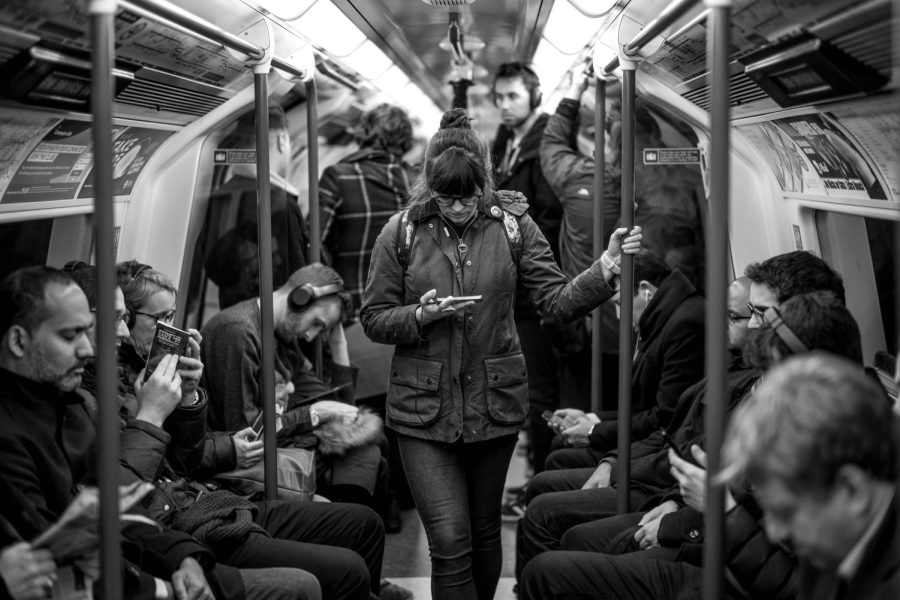Column: The dark side of social media and the screen
“People Using Phones” by Tom Coates is licensed under CC BY-NC 2.0
People continue to use social media to portray a fake version of themselves.
October 8, 2021
Content warning: Discussion of anxiety, depression and eating disorders.
Editor’s note: The News wants students to know Northeastern University and elsewhere provide mental health resources for students.
- WeCare: wecare@northeastern.edu, 617-373-7591, 226 Curry
- University Health and Counseling Services (UHCS): uhcs@northeastern.edu, 617-373-2772, Forsyth Building, 1st Floor
- 24/7 Mental Health Support: for students by phone (FIND@Northeastern) – 877-233-9477 (U.S.), 781-457-7777 (international)
- Suicide Prevention Hotline: 1-800-273-8255
- Eating Disorder Hotline: (800) 931-2237
- 24/7 Anxiety Text Support: Text HOME to 741741
Since the creation and rise of social media, the mental health of youth all over the world has been at an all-time low. This is not just a coincidence. Studies show that there is a clear link between usage of social media and increasing rates of anxiety and depression in teenagers, which does not come as a surprise to many. As a society, we collectively are aware of how addicting social media is, yet we knowingly spend our free time scrolling into oblivion.
Even though wasting time is definitely a negative, there are more impacts from this than just being a zombie who is on their phone all day. Negative body image is just one of the many possible effects of engaging in social media, especially on apps like Instagram or TikTok. Not only is it detrimental for young girls to compare themselves to others they see on these apps but also most of what they are comparing themselves to is not even real. Editing and photo retouching apps like Facetune promote a false reality and beauty standards that teens work hard to try to maintain. Additionally, these apps are obviously populated by a disproportionate amount of fitness influencers compared to the general population, skewing beauty standards and causing low self-esteem.
There is a saying I fully believe in: “Comparison is the thief of joy.” I believe that social media perpetuates this to no end. Body image issues can contribute to the onset of many eating disorders, with anorexia nervosa being the most fatal mental illness known to date.
Although some may argue that social media brings people together, and to some extent it does, we must be very cognizant of its negative effects. The University of Pennsylvania conducted a study that showed high usages of social networking apps increase feelings of loneliness.
As stated before, rates of depression and anxiety in younger people in the United States have skyrocketed within the last few years, and this can be partially attributed to social media, where people can portray their lives in the most positive light. What many tend to forget, however, is precisely that: People are posting what they want the world to see on their feed. A majority of pictures posted on Instagram are posed and took over an hour to edit and think of a “suitable” caption. Not everything online is what it appears to be.
From firsthand experience, I know how incredibly harmful the impacts of social media can be. I have spent more time than I would like to admit looking at other people’s highlight reels. What I didn’t understand was that most of what I was seeing wasn’t my reality. Not understanding this concept made me feel like my life was inadequate and lacking. I felt like my Instagram feed defined who I was, even though that is just simply not the truth. Your Instagram feed or profile does not define you as a person. There is no need to wear a mask in order to “fit in” on a social media app. Understanding this has been extremely beneficial to my mental health. I no longer feel the need to update my Instagram or stress about the “persona” that I display.
It is difficult to determine a clear solution to end this social media epidemic and addiction. Tech companies will continue to do their job in finding ways to make these apps even more addicting and hard to stop using. Social media, at the end of the day, is a business, and its workers will find ways to profit off of its users no matter what. Despite this, I do think there are some ways to decrease the negative side effects of social media use. What I hope Northeastern students — as well as youth all over the world — take away from this is that there is so much more to life than living through a screen. As students, we can all try to spend less time on our devices and more time outside with the people we care about. These are examples of proven ways we can actively improve our mental health and prioritize time off our phones. We can also promote mental health resources and do our part to have conversations or dialogue on these issues. This further acts to decrease the stigma that continues to surround mental health. Northeastern also has a responsibility to advocate for the mental health of their students. To do this, University Health and Counseling Services needs to be further improved. As a university, we have a responsibility to be kind to one another and realize that we do not know what someone else might be going through.
A final reminder for anyone reading: You are enough and worth more than any number of likes or followers on Instagram. You do not have to change yourself to better fit the standards perpetuated by social media. You deserve to feel happy with who you are.
Alyssa Endres is a third-year political science and communication studies double major. She can be reached at endres.a@northeastern.edu.







